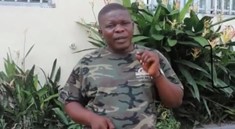By Amin Kef (Ranger)
A video featuring North-East Resident Minister, Abu-Abu Abdulai Koroma, has stirred widespread controversy, prompting calls for his immediate dismissal. Critics describe the footage as the embodiment of tribalism, promoting hatred, malice and personal vendettas.
In the video, Koroma is heard saying: “One of the main reasons I chose to build in Bo, and not Makeni, is because the Temne people are not civilized, unlike the Mende people,” a comment that has been widely condemned.
Experts view this statement as not only deeply offensive, but potentially disruptive to the unity and cohesion of Sierra Leone. It contradicts the President’s commitment to uphold peaceful co-existence, a principle founded on the appreciation of tribal diversity.
Peace advocates regard Koroma’s words as a direct threat to national harmony, particularly coming from a political figure that represents the Presidency in his administered territory. They argue that such rhetoric obstructs progressive reforms aimed at embracing cultural diversity, stifles tolerance, and exacerbates divisions at regional, sectional, and tribal levels.
Koroma continues to draw ire with his comments, adding: “We have many Temne people who own houses, but you never hear of their houses being burnt; I, however, live under constant threat, which is why I decided to move my family to Bo.”
These statements have raised more questions than answers, and have left critics questioning Koroma’s understanding of the political climate and his capacity as a Minister.
The backlash against Koroma’s comments has been swift and vocal. Critics argue that his remarks are especially untimely, given the country’s current need for peace and stability.
One resident expressed his disappointment, stating, “You and your family have been in the Temne Land since the beginning, but just five years of politics, and you have turned against us. Now we are the worst people…”
Prominent Political Commentators have similarly voiced their concerns. They emphasize the potential for these statements to widen the existing divisions in Sierra Leone, already strained by ethnic and political lines.
The presidency is now under pressure to demonstrate that Koroma’s views do not reflect those of the Government. While an apology or dismissal may not fully heal the wounds caused by Koroma’s comments, a lack of action could be seen as an endorsement of tribalism within the Sierra Leone People’s Party.
Critics argue that this is not the first time Koroma has made incendiary comments. In a previous video, he threatened to shoot and kill protesters in the North, a threat that tragically materialized.
The question now is: How does a Resident Minister justify making such statements against the very people he is meant to serve? The answer will determine the future of tribal relations and political decorum in Sierra Leone.
There are widespread calls for Koroma to either apologize or face immediate dismissal. The country watches and waits for the presidency’s response.





